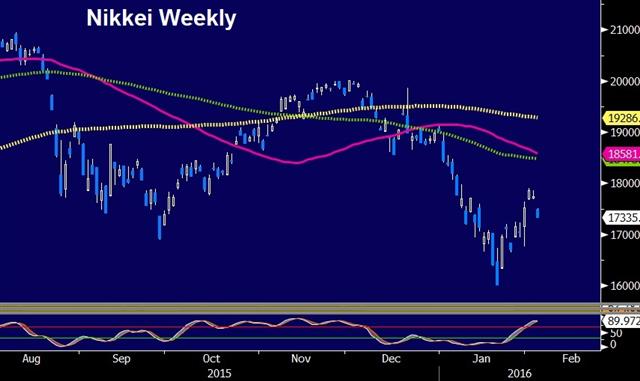Déjà Vu All Over Again
It was Groundhog Day on Tuesday and the Bill Murray movie of the same name was a perfect description because it was a replay of theme and market moves we saw over and over again in January. The yen led the way as oil, stock markets and commodity currencies dropped. However the New Zealand dollar rebounded on a blockbuster employment report in early Asia-Pacific trading. Yesterday's Premium trade in gold was supported with technical charts and the relationship between bullion and in gold miners. A new JPY trade was added today.
فيديو العربي 59 دقيقة كاملة على البورصات، الذهب، العملات و النفط

The Fed didn't do the market any favours today as George continued to press for more hikes, although she qualified it by saying the Fed always evaluates the economic outlook. US data on car sales were a healthy sign for the consumer but those small positives could weigh a 6% decline in oil.
More energy market problems resurfaced by a second day of heavy downgrades and warnings in the oil sector from Standard & Poor's. The ratings agency cut Chevron and put the major US producers on credit watch for downgrades. More importantly, that same credit stress is hitting smaller indebted oil producers hard.
It's also hitting oil-exporting sovereigns and there is persistent talk that they will be forced to liquidate sovereign wealth fund holdings.
At the moment, the resilience in CAD remains impressive. Oil has fallen $5 from last week's highs and yen USD/CAD is just 150 pips above its lows.
What offers hope to the USD/CAD bears is something of a pattern developing in the developed-world commodity producers. In January, Poloz was upbeat on the non-commodity sector. Yesterday, Stevens was similarly positive on the outlook for the domestic economy (while expressing worries about emerging markets). Today, New Zealand announced a shocking drop in unemployment to 5.3% from 6.1% in Q4.
There is no doubt that parts of Canada, Australia and New Zealand will be hard hit by the commodity drop but we are keeping an open mind on the idea that other parts of the economy may prove resilient. That may be a factor of the exchange rate, economic flexibility or built-up savings from the 15-year commodity boom. Or it might just be a matter of time before they crack.
The next data on the agenda is Australian trade balance at 0030 GMT. It's expected at a deficit of 2.45m million but we will closely watch the breakdown of imports and exports. If exports rise, it could be a sign that a weak AUD is helping.
At 0145 GMT, the Caixin China services PMI is due for release. The prior reading was 50.2. It's not likely to be a big market mover.
Fifteen minutes later, the Japan PMI for services is out. The prior reading was 51.5.
| Act | Exp | Prev | GMT |
|---|---|---|---|
| Markit PMI Composite (JAN) | |||
| 53.7 | Feb 03 14:45 | ||
| Markit Services PMI (JAN) | |||
| 53.7 | Feb 03 14:45 | ||
| ISM Non-Manufacturing PMI (JAN) | |||
| 55.1 | 55.3 | Feb 03 15:00 | |
| PMI (JAN) | |||
| 50.5 | 50.2 | Feb 03 1:45 | |
Latest IMTs
-
NFP & CPI Credibility
by Ashraf Laidi | Aug 11, 2025 16:35
-
Forecaster App التطبيق الذي كنت تنتظره
by Ashraf Laidi | Jun 18, 2025 10:55
-
Updating GoldBugs تحديث مناجم الذهب
by Ashraf Laidi | Jun 16, 2025 13:58
-
Breaking Debt Ceiling & Forex Brokers
by Ashraf Laidi | Jun 6, 2025 17:33
-
Recession Metric & Tariff Marsh
by Ashraf Laidi | May 26, 2025 13:47







